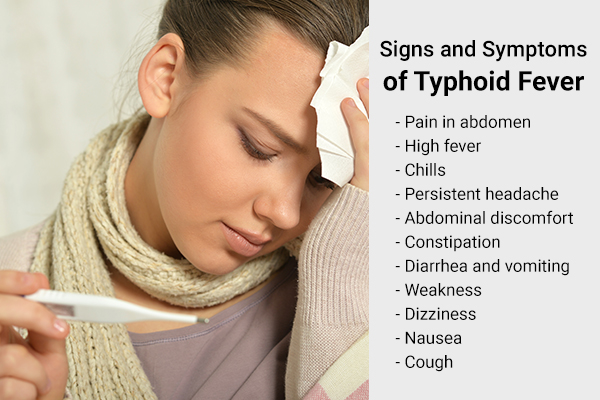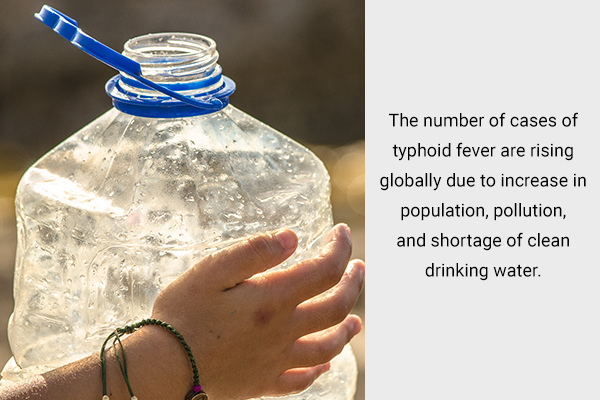In this article:
Typhoid fever is also known as enteric fever. It is a multisystemic disorder that is a threat to public health, particularly in the evolving world. It is caused by bacteria called Salmonella typhi.

Typhoid fever is one of the leading causes of mortality and morbidity in regions that are pretty overcrowded and unhygienic, but thankfully, nationwide interventions have reduced its burden.
The disease usually begins with early gastrointestinal discomfort, hence its name enteric fever, and progresses to systemic illness and may lead to numerous complications.
Salmonella spreads by: (1)
- Flies
- Fingers
- Feces
- Fomites
Read on to find out more about typhoid fever, who is at risk, and how to know if it’s serious.
Causative Agent of Typhoid Fever
The primary causative agents of typhoid fever are Salmonella typhi and Salmonella Paratyphi, which are members of the family Enterobacteriaceae.
Salmonella is transferred by the fecal-oral route via polluted water and undercooked foods and is more persistent in regions with overcrowding and poor sanitation practices. It is only conveyed from an affected person to a healthy person as humans are its only host. (1)
The fecal-oral route is important in the transmission of the disease, and S. typhi is transmitted more frequently by water than by food.
Signs and Symptoms of Typhoid Fever

Signs and symptoms of typhoid fever usually include: (2)
- Pain in the abdomen
- High fever, which is the major presenting factor in the initial stages
- Chills
- Persistent headache
- Abdominal discomfort
- Constipation
- Diarrhea and vomiting
- Weakness
- Dizziness
- Nausea
- Cough
Note: During the initial week, it is common to observe rose-colored spots on the trunk and an enlarged spleen as symptoms of typhoid fever. In the second week, if left untreated, delirium (confusion) may occur, which can progress to coma and even death. (3)
Management of Typhoid Fever
Management of typhoid fever and stopping its spread involve a focus on improved sanitation and better access to clean and safe water and food.
Furthermore, the typhoid conjugate vaccine (TCV) has been verified and advised by the World Health Organization for routine use and can become a tool to finally lower the burden of typhoid illness and deaths with advancements in sanitation, water, and food safety departments.
Antibiotics such as chloramphenicol and amoxicillin remain the first-line treatment for typhoid. Other microbial agents include:
- Ciprofloxacin
- Norfloxacin
- Ceftriaxone
- Cefixime
- Azithromycin
- Aztreonam
Supportive treatment options are necessary for the management of typhoid fever, such as oral or IV hydration, a tepid bath or sponging, and proper nutrition. In some cases, blood transfusions may be indicated.
More than 90% of patients can be taken care of at home with oral antibiotics, a dependable caretaker, and intimate medical follow-up for intricacies or failure to respond to treatment. (4)(5)
Who Is At-Risk for Typhoid Fever?

The gut flora plays a protective action against typhoid infection. The usage of antibiotics such as streptomycin demolishes the normal flora. Therefore, those who use broad-spectrum antibiotics are more susceptible to this ailment.
Furthermore, malnutrition is known to disrupt the normal gut flora and thereby increases the defenselessness to this infection.
Most infections in developed nations are carried by tourists or those returning from endemic regions. Also, travelers stopping by to visit relatives and friends that are living in these high-risk areas have an increased likelihood of catching the infection.
Those who do not go for vaccination and pre-travel checkups are also at increased risk. Typhoid fever is more dominant in temperate and tropical environments. The number of cases of typhoid fever is rising globally due to the increase in population, pollution, and shortage of clean drinking water. (1)
Complications of Typhoid Fever
Late diagnosis of typhoid fever or failure to treat it on time may cause severe complications, which comprise: (2)(4)
- Cerebral dysfunction (abnormal functioning of the brain)
- Perforation of the gut wall (a hole or rupture in the wall of the intestine or stomach)
- Gastrointestinal hemorrhage (bleeding in the digestive system)
- Shock (the body’s organs are not receiving enough blood and oxygen)
- Hepatitis (inflammation of the liver)
- Cholecystitis (inflammation of the gallbladder)
- Myocarditis (inflammation of the heart muscle)
- Encephalopathy (brain dysfunction or damage)
- Pneumonia
- Anemia
Note: Complications can be categorized into three types: bowel-related complications such as a hole in the gut wall or bleeding; septicemia-related complications such as bone and joint infections, meningitis, or gallbladder inflammation; and toxic complications such as inflammation of the heart muscle or kidneys.
Can Typhoid Fever Be Life Threatening?

Yes, typhoid fever is a life-threatening systemic disorder caused by S. typhi. Sadly, the spread of this disease is still very high mainly due to the worldwide burden of many drug-resistant Salmonella strains, which causes challenges in treating the condition and increases the risk of mortality. (6)
Final Word
Typhoid fever is a disorder caused by the bacteria S. typhi. The main signs include high fever, diarrhea, and vomiting. In a few patients, severe complications can be observed.
Without proper treatment or if left untreated, 30% of typhoid cases can end up being fatal. With the appropriate antibiotic treatment, typhoid can be resolved easily. Be cautious around contaminated food and water or in areas where the disease spreads easily.
 Continue Reading6 Home Remedies to Help Manage Typhoid Fever
Continue Reading6 Home Remedies to Help Manage Typhoid Fever
- Was this article helpful?
- YES, THANKS!NOT REALLY


